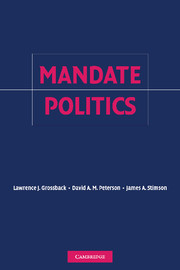Book contents
- Frontmatter
- Contents
- List of Figures
- List of Tables
- Preface
- Acknowledgments
- 1 A Single Time in a Single Place
- 2 The Evolution of Mandates
- 3 Members of Congress Respond
- 4 The Pattern of Congressional Response
- 5 Consequences
- 6 The Irresistible Meets the Unmovable
- 7 Conclusion: A Mandate View of Normal American Politics
- Bibliography
- Index
3 - Members of Congress Respond
Published online by Cambridge University Press: 14 August 2009
- Frontmatter
- Contents
- List of Figures
- List of Tables
- Preface
- Acknowledgments
- 1 A Single Time in a Single Place
- 2 The Evolution of Mandates
- 3 Members of Congress Respond
- 4 The Pattern of Congressional Response
- 5 Consequences
- 6 The Irresistible Meets the Unmovable
- 7 Conclusion: A Mandate View of Normal American Politics
- Bibliography
- Index
Summary
In 1981, the two representatives from Dade County, Florida, Democrats Claude Pepper and Dante Fascell were quite similar. Both had held their seats since at least 1963. Both were more in line with the Northern wing of the party than with Southern Democrats, although since 1968 Fascell was as least as, if not more, liberal than Pepper according to the ADA. They both won reelection by relatively large margins. Pepper received 75 percent of the vote, whereas Fascell won 65 percent. In 1980, they voted together 92 percent of the time. Their districts, in addition to being contiguous, were also quite similar. By 1981, Dade County was becoming increasingly Cuban (a trend continued through the 1980s), and both districts were becoming less Democratic. In 1976, both districts gave majorities to the Democratic candidate Jimmy Carter, Pepper's district giving Carter 56 percent of its vote, Fascell's giving 53 percent. In 1980, both districts went for Republican Ronald Reagan with an identical 55 percent of the vote.
The similarity gave way to difference on one particularly important vote. On May 7, 1981, the House of Representatives took its final vote on the budget reconciliation bill. This single vote was the broad blueprint of the Reagan revolution. It deliberately tied the hands of the Congress later in that session by forcing large cuts in spending and taxes.
- Type
- Chapter
- Information
- Mandate Politics , pp. 63 - 105Publisher: Cambridge University PressPrint publication year: 2006



